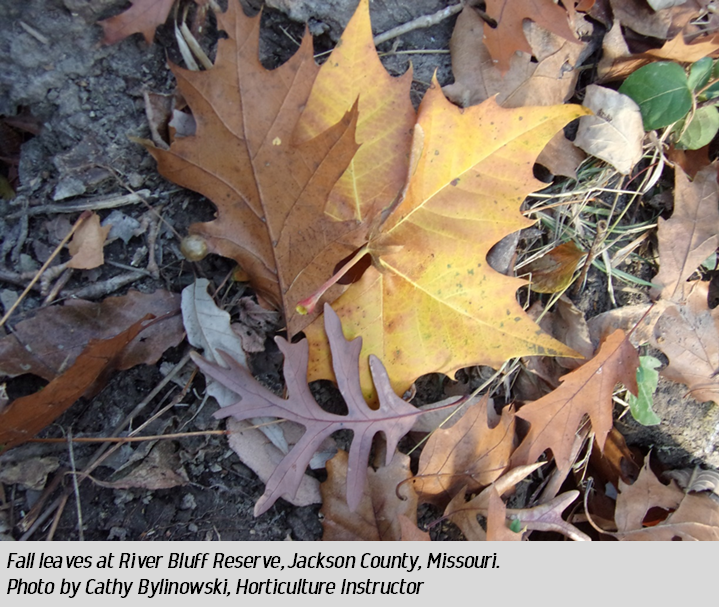|
|
by Cathy Bylinowski, University of Missouri Extension Horticulture Instructor Sugar maples, sweet gums, and black cherries gave us a beautiful show this fall with their bright oranges, pinks, and yellows, but those leaves fell to the ground in my neighborhood last weekend.
Many of us like the sweet scent of fallen sycamore and oak leaves, but do not look forward to raking them up! If you don’t look forward to filling sacks with fallen leaves, University of Missouri Extension Field Specialists in Horticulture suggest turning at least some of those fall leaves into a valuable resource- compost and mulch! The carbon content of fallen leaves is a great addition to the nitrogen content of old, annual landscape and garden plants and helps create good compost. However, it is unlikely that the proportion of fallen leaves to compostable plant material will result in the recommended 30-to-1 carbon-to-nitrogen ratio for a good compost pile. Since fallen leaves have a carbon-to-nitrogen ratio of about 50-to-1 and freshly uprooted green plants come in around 20-to-1 on average, a good approach is to add twice as much plant material as leaves to the compost bin if possible. This will come close to the recommended ratio and allow for contributions from the kitchen compost pail. Vegetable food scraps such as apple, banana, and winter squash peels, avocado shells, and salad scraps can be added to the compost pile. Because adding fallen leaves and garden plants in layers will allow for better decomposition, try to stockpile some leaves and add them in layers to the compost pile. This will result in several small contributions of leaf material to the bin—a better option than dealing with a lump sum of leaves at the end of the season. Couple this with regular culling of unproductive or fading garden plants and you’ll be able to contribute the appropriate ratio of each to the compost pile on a regular basis and make end-of-the-season cleanup in the yard and garden easier. If you have more leaves than the compost pile can take, that might mean that you have a lot of shade on your landscape. Heavily shaded areas where turf is difficult to establish may best be converted to a ‘forest floor’ landscape where leaves are allowed to aggregate among shade-tolerant native wild flowers and other perennial plants. Another use for surplus leaves is to spread them directly onto the vegetable garden to decompose over winter. Decomposing leaves add beneficial organic matter and nutrients such as phosphorus and potassium to garden soil that helps hold nutrients and moisture in the soil and helps prevent soil erosion. Add a layer of 6-8 inches of leaves and gently work them into the soil. Earthworms appreciate fallen leaves, too. Earthworms also help leaves decompose and add more organic matter to the soil. Leaves do not significantly alter the pH of garden soil. Even oak leaves, which are acidic when fresh, break down to be neutral to slightly alkaline after going through the decomposition process. One important item you can consider purchasing for your leaf composting project could be a compost thermometer. Compost thermometers are longer than a typical thermometer and usually have ranges of temperatures highlighted to let you know if the pile is actively composting or not. It is a good way to know if your leaves and other garden organic matter in your compost pile are biodegrading into a valuable and beneficial soil amendment. More information about composting and mulching is available in these MU Extension publications. These publications can be downloaded for free at https://extension.missouri.edu/ “Making and Using Compost” https://extension.missouri.edu/publications/g6956 “How to Build a Compost Bin” https://extension.missouri.edu/g6957 “Mulches” https://extension.missouri.edu/publications/g6960 Have more fall gardening questions? Please call University of Missouri Extension in Jackson County, at 816-482-5950, contact the Extension Master Gardener Hotline at 816-833-TREE (8733), or explore our website at https://extension.missouri.edu/counties/jackson Comments are closed.
|
Categories
All
Archives
July 2024
|
Grain Valley NewsGrain Valley News is a free community news source published weekly online. |
Contact Us |



 RSS Feed
RSS Feed
